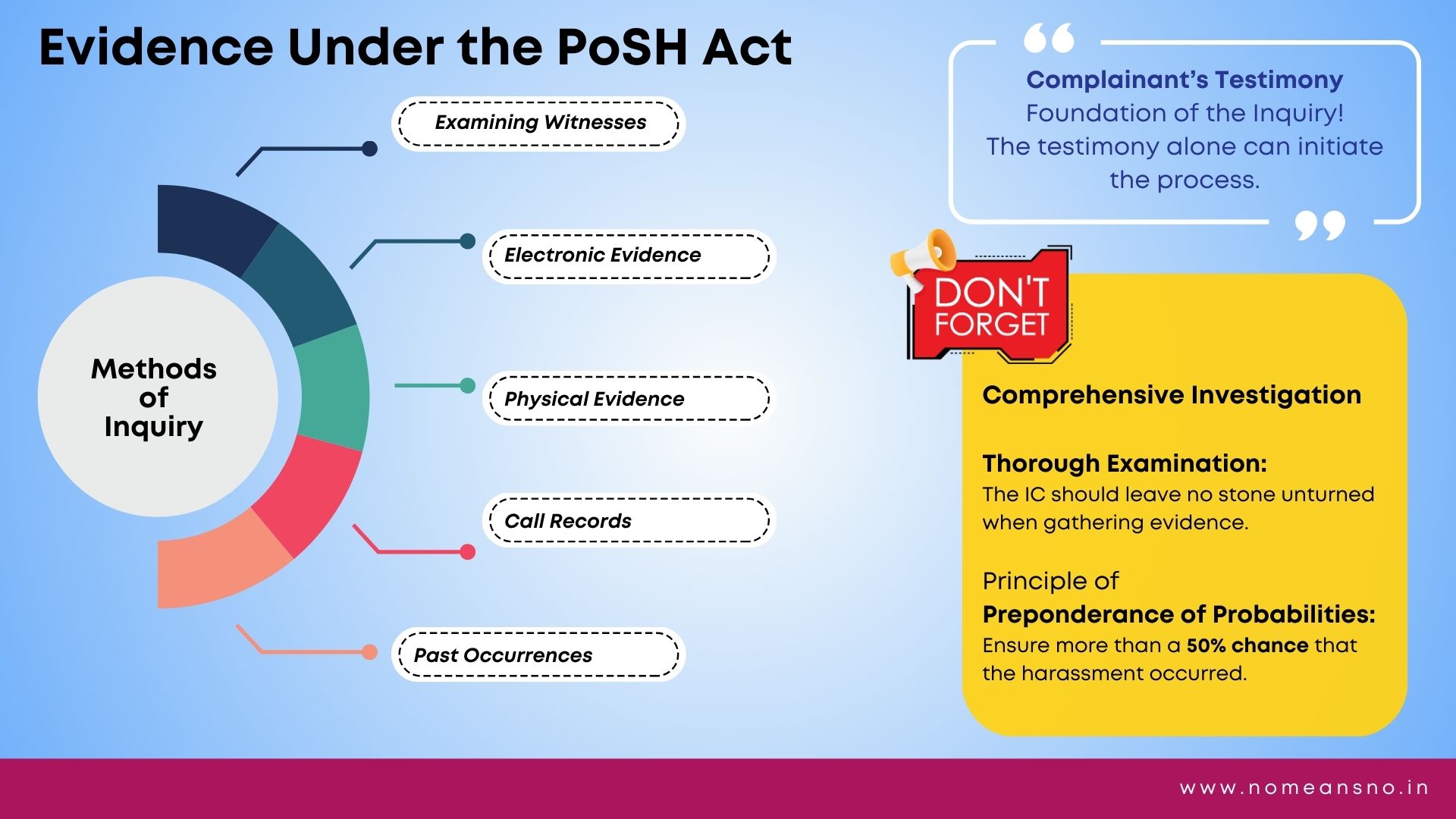Navigating POSH Investigations: The Importance of Evidence in Sexual Harassment Cases
The Internal Committee (IC) is a quasi-judicial body formed under the Sexual Harassment of Women at Workplace (Prevention, Prohibition, and Redressal) Act, 2013, also known as the POSH Act. This committee’s primary responsibility is to prevent sexual harassment in the workplace and to conduct thorough inquiries into any complaints received. A significant challenge the IC often faces is the absence of direct evidence or witnesses, as many incidents occur in private or subtle interactions.
Proceeding Without Direct Evidence
What happens when there’s no concrete evidence to support a sexual harassment claim? Should the absence of evidence dissuade victims from coming forward?
In situations where evidence or witnesses are lacking, the IC must still proceed with the investigation. The POSH Act explicitly states that the absence of evidence should not deter the filing or acceptance of a complaint. This provision is crucial because the stigma surrounding sexual harassment often prevents victims from coming forward. Therefore, the IC must reassure complainants that their cases will be treated with the utmost seriousness and respect, regardless of the availability of direct evidence.
Gathering Available Evidence
How can the IC build a case without direct evidence? What steps can they take to ensure a thorough investigation?
Even without direct evidence, the IC can employ various methods to build a case. These include:
Detailed Accounts: Collect comprehensive narratives from both the complainant and the respondent. This helps to understand the context and sequence of events.
Electronic Records: Verify the presence of the involved parties at the incident location using electronic access card data and calendar entries. Review CCTV footage if available. This can provide circumstantial evidence supporting the claims.
Indirect Witnesses: Speak to individuals who were nearby during the incident. They might have observed body language or overheard conversations. This indirect evidence can be crucial in piecing together the incident.
Secondary Conversations: Interview colleagues who the parties might have spoken to about the incident. Understanding what was shared with others can shed light on the situation.
Background Checks: Review the history of both parties. Previous false allegations or repeated offenses can provide context, though they should not solely determine the outcome.
Motives: Assess whether there could be any motives for fabricating the complaint. It is essential to ensure that the complaint is genuine and not driven by malicious intent.
Making a Decision: Preponderance of Probability
What standard of proof does the IC use to determine the outcome of a case? How does the IC decide if the harassment likely occurred?
The IC’s conclusions are based on the “preponderance of probability” standard, meaning that if the evidence suggests that it is more likely than not that the harassment occurred, the IC can find the respondent guilty. This standard is lower than the “beyond a reasonable doubt” threshold used in criminal cases.
Case Study
Consider the case of Meera, an employee at XYZ Corporation. Meera files a complaint with the IC, alleging that her manager, Raj, made inappropriate comments and advances during one-on-one meetings. There are no witnesses, and the comments were not recorded.
Despite the lack of direct evidence, the IC proceeds by gathering detailed accounts from Meera and Raj. They check electronic records and find that Meera and Raj were indeed in the same location at the times mentioned. They also speak to colleagues who noticed Meera’s discomfort after her meetings with Raj. Additionally, they find that Raj has a history of making borderline inappropriate comments, although he has never been formally reported before.
Based on the collected circumstantial evidence and the preponderance of probability standard, the IC concludes that Raj likely made the inappropriate comments. They recommend appropriate actions against Raj to prevent future incidents.
Why is it essential for organizations to invest in POSH training for their IC members? How does thorough training empower the IC to handle complex cases?
The IC plays a vital role in maintaining a safe workplace environment. Organizations must ensure their IC members are well-trained to handle cases with or without direct evidence. Proper training, including scenario-based learning and case studies, can empower the IC to fulfill its duties competently and justly.
We at NoMeansNo are domain experts ready to assist Internal Committee members not only in effectively managing all investigations but also in ensuring total compliance at all times.

Demystifying the Supreme Court’s POSH Act 2013 Directives
The Supreme Court of India has recently issued crucial directives concerning the Prevention of Sexual Harassment (POSH) Act 2013, providing directions for organizations and professionals alike. To help you unlock the full potential of these directives, we’ve created an easily understandable and accessible document that breaks down complex legal jargon into clear, actionable steps.

Understanding the dynamic landscape of POSH compliance and workplace safety, we continually develop sessions and resources to meet your needs. Enclosed is a brochure detailing our upcoming events and the comprehensive range of POSH offerings. From training sessions to consultancy services, we strive to equip you with the expertise to navigate the complexities of workplace safety and compliance.
Should these offerings spark your interest or if you wish to delve deeper into how we can support your organization’s specific needs, we’d be delighted to arrange a quick meeting to explore potential collaborations.
Our goal is to be a partner in your journey towards creating a safer, more compliant workplace, and we are here to support you every step of the way.
Thank you for your time and consideration. We look forward to the opportunity to contribute to your organization’s success in maintaining a safe and compliant work environment.
We are keen on evolving our communication to offer you more than just information about our events. It’s about providing real value and tools that support your efforts in maintaining a compliant and safe workplace.






